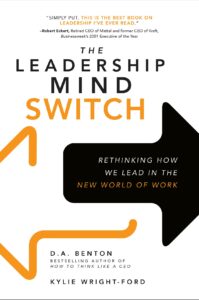Flip the Switch
I’m often giving keynote speeches about the rapid-fire pace of change. From artificial intelligence to the gig economy, the world of work is changing at a record pace.
The Leadership Mind Switch is a new book by authors Debra Benton and Kylie Wright-Ford that helps leaders position themselves for the future in the midst of these changes. To keep up and succeed, you want to understand how to navigate to drive growth well into the future.
Rethink How We Lead
Why is it important to rethink how we lead?
While it is always important to grow and develop as leaders, we are experiencing an historical era where tech advances married with sweeping demographic changes, plus a shift in the power base from corporations to individuals, have upended the way the future looks for work, workplaces and workers.
 The sharing economy, the low marginal cost of becoming an entrepreneur and the preferences of rising generations mean that leadership behaviors of the past will fail in a quest for relevancy in our physically and digitally fused world. Yet leaders are still using biographies of their favorite leaders from the 80s and 90s as their guides for the future.
The sharing economy, the low marginal cost of becoming an entrepreneur and the preferences of rising generations mean that leadership behaviors of the past will fail in a quest for relevancy in our physically and digitally fused world. Yet leaders are still using biographies of their favorite leaders from the 80s and 90s as their guides for the future.
As a Chief Operating Officer meeting hundreds of the world’s best executives, I was struck by the slow pace of change in the way we interact in the workplace relative to the pace of change in the outside world, the changing complexion of our customer bases in business and the demands of the rising generations. Legacy thinking and iterations on past methods won’t cut it in the new world of work, yet many leaders are “nibbling at the edges” of the changes they need to implement to attract and retain talent and, frankly, to remain relevant. Free food and subsidized health memberships are not enough anymore. Dramatic shifts in the characteristics and behaviors we value are needed to thrive going forward.
The Importance of Trust
The dizzying pace of change often make us believe that everything is upended, but some things have not changed for leaders. What is something that remains unchanged and just as important in terms of leadership?
The ideal of being trusted and trustworthy has not changed over time. It is as important now as it ever was, especially in the eyes of those impacted by less than honest leaders, but what is different now is our ability to get transparency on and take action against leaders that lie, cheat and create subversive cultures.
The optimism of people and yearning for strong leadership, whether real or perceived, can often mask less than trustworthy behavior for a period of time. However, we are entering an era where rising generations are seeking more from their leaders and their organizations. Consumers, workers and competitors have more ability than ever to call out bad behaviors, share good behaviors and make choices.
I have unwavering belief in our ability as a society to sift through the noise of leaders who are untrustworthy and that we have an opportunity to set a new bar for leaders who create positive cultures, leave enduring legacies and inspire those coming behind and beside them. We just aren’t there yet.
What behaviors do leaders need today that may not have been “musts” in the past?
The two qualities that leaders need today in doses different to and higher than the past are (1) being playful and (2) unblocking your people. With the rise of artificial intelligence in the workforce, uniquely human traits like creativity, judgment and contextual humor are musts going forward, and these two qualities speak to our wonderful humanity in the workplace. We are working at a time when “FOBO” – The Fear of Becoming Obsolete – is a reality.
Being “playful” means to us the idea of being easy to get along with, seeing humor in the sometimes absurd outside world we operate our businesses within and honoring the blurry lines between our personal and professional lives. These blurry lines are a permanent fact of life with our “electronic leashes” – which is what one of our book contributors wryly called their smartphone.
Unblocking your people is a simple but overlooked behavior. It is about letting go of the way things are (or used to be) and opening the door to new ways of doing everything while maintaining a culture of storytelling and values. Good leaders in the future will be adept at making judgments on the risk of letting a newcomer and/or trusted colleague try new things with support and guidance instead of skepticism and fear.
Understand Generational Differences
You spend some time reviewing different generations in the workplace. Why is this important for a leader? Are there any common challenges between two generations that you see stand out?
Increasingly the collision of demographic shifts, as we near the time when 50% of the workforce will be millennials and tech advances that enable our ability to operate remotely, quickly and collaboratively opens a crevice of potential frustrations for intergenerational workforces. Leaders need to be the kindly confident type who can seamlessly understand the communication norms of the rising generations (many-many) equally as comfortably as they do the need for in-person relationships that boomers are said to prefer, embrace new technologies and be able to see value that can be created when acceptance and accommodation between generations is achieved. The common challenges that we see between generations is the struggle for recognition of the unique traits that an individual brings to an organization and the desire for relevance irrespective of age, gender, culture or work style (e.g. introvert or extrovert).
Trust is one of the constants in leadership and yet you also point out that we are all human. In what ways should a leader build trust today that may not have been possible previously?
 The concepts of a leader bringing “their whole self” to work, being “authentic” and accepting “failure” have gained popularity in the last decade and in some cases even fame based on viral Ted Talks and similarly popular media sharing of videos and memes that promote them.
The concepts of a leader bringing “their whole self” to work, being “authentic” and accepting “failure” have gained popularity in the last decade and in some cases even fame based on viral Ted Talks and similarly popular media sharing of videos and memes that promote them.
Today we have more media to work with to make ourselves accessible and show that we are trustworthy and maybe fallible-but=good leaders who are true blue will thrive in the era of transparency. Others will be found out. Being uber-communicative and consistent will set you apart if you can master the many channels that we now have to build a story and make an impact.
Build a Supportive, Positive Culture
How do leaders best build a supportive, positive culture?
One of my favorite quotes from a former colleague is “leaders bring the weather.” Building a supportive, positive culture means bringing sunshine most of the time and even when it is stormy being stable and owning the outcomes that are produced. Most workers’ nightmare scenario is a mercurial and unpredictable leader who can swing from celebrating to berating in a nano-second. Don’t be that person.
For more information, see The Leadership Mind Switch.

